Web Menu
Product Search
Exit Menu
Top Strategies for Choosing the Perfect Outdoor Sofa for Your Space
As outdoor living spaces continue to gain popularity, the demand for high-quality outdoor furniture, particularly outdoor sofas, has skyrocketed. According to a recent report by the American Home Furnishings Alliance, the outdoor furniture market is expected to reach $10 billion by 2024, reflecting a shift in consumer preferences towards creating comfortable and stylish exterior environments.

Choosing the perfect outdoor sofa is not just about aesthetics; it's a critical decision that impacts the functionality and enjoyment of your space. Factors such as materials, comfort, and design must be carefully considered to ensure that your investment stands the test of time while enhancing your outdoor experience.
This blog will explore the top strategies for selecting the ideal outdoor sofa, ensuring you make a choice that aligns with your lifestyle and space requirements.
Key Considerations for Selecting Outdoor Sofa Materials and Durability
When selecting the perfect outdoor sofa, materials and durability should be at the forefront of your decision-making process. Outdoor furniture is exposed to various elements, including sunlight, rain, and temperature fluctuations, which can significantly affect its lifespan. Opt for materials that are specifically designed for outdoor use. For instance, aluminum frames are lightweight and corrosion-resistant, making them a popular choice. Similarly, synthetic wicker or resin is not only aesthetically pleasing but also resilient against UV rays and moisture, ensuring that your furniture maintains its look over time.

Another critical factor to consider is the cushioning and upholstery of the sofa. Choose fabrics that are fade-resistant and water-repellent, such as solution-dyed acrylic, which stands up well against harsh weather conditions. Additionally, look for quick-drying foam cushions that prevent mold and mildew growth. Investing in high-quality materials for both the frame and cushions will not only enhance the comfort of your outdoor space but also extend the longevity of your sofa, allowing you to enjoy outdoor living for years to come.
Creative Configurations: Designing Your Outdoor Sofa Layout for Maximum Comfort
When designing your outdoor sofa layout, maximizing comfort and space efficiency is paramount. One of the leading trends this summer emphasizes versatile configurations that suit various outdoor settings, ensuring your alfresco space is both stylish and functional. Modular sofas are particularly popular for their adaptability; for instance, they can be reconfigured to accommodate intimate gatherings or larger parties. According to industry reports, modular outdoor furniture sales have surged by over 30% in the past year, signaling a shift toward solutions that blend form and flexibility.
Incorporating creative arrangements can exponentially boost your outdoor experience. For small patios, utilizing vertical space through tiered seating can create a cozy yet open atmosphere. Designers suggest layering furniture and adding colorful accents that blend seamlessly with natural surroundings, allowing for both aesthetic appeal and comfort. Additionally, adding cushions with soft outdoor fillings enhances relaxation, mirroring the designs from innovative brands that focus on ergonomic structures. Experts claim that thought-out layouts contribute significantly to the overall satisfaction of outdoor living spaces, making it essential to evaluate your design choices carefully.
Top Strategies for Choosing the Perfect Outdoor Sofa for Your Space
This chart illustrates the importance of different factors when choosing the perfect outdoor sofa. Comfort ranks the highest, followed by durability, design, size, and configuration.
Exploring Sustainable Alternatives: Eco-Friendly Outdoor Sofa Choices
When choosing an outdoor sofa, sustainability should be a key consideration. Eco-friendly materials not only minimize your carbon footprint but also ensure that your outdoor space remains stylish and functional. Look for sofas made from recycled materials, such as aluminum frames or plastics crafted from post-consumer waste. These options are not only durable but resist common outdoor elements, making them a smart investment for longevity.
Another fantastic option is furniture made from sustainably sourced wood. Teak, eucalyptus, and bamboo are excellent choices due to their rapid growth rates and natural resistance to moisture and pests. Pairing these materials with cushions made from organic, non-toxic fabrics can create a comfortable and environmentally friendly seating area. By opting for these sustainable alternatives, you can enjoy your outdoor oasis while contributing positively to the environment.
Styles and Aesthetics: Matching Your Outdoor Sofa to Your Home’s Design
When selecting an outdoor sofa, it's essential to harmonize its style and aesthetics with your home's overall design. The first step is to consider the architectural elements of your space. For example, if your home features a modern design with clean lines, opt for a sleek, minimalist outdoor sofa made from materials like metal or synthetic wicker. Such choices will not only enhance the contemporary feel but also create a seamless transition between your indoor and outdoor areas.
On the other hand, if your home leans towards a traditional style, a more classic outdoor sofa, perhaps upholstered in rich fabrics with intricate detailing, can complement your design beautifully. Earthy tones and natural materials will resonate well with a rustic or country aesthetic, making your outdoor area feel inviting and cohesive. By thoughtfully matching the outdoor sofa to your home’s design, you not only elevate the visual appeal of your space but also ensure comfort and functionality that aligns with your lifestyle.
Top Strategies for Choosing the Perfect Outdoor Sofa for Your Space - Styles and Aesthetics: Matching Your Outdoor Sofa to Your Home’s Design
| Style Type | Material | Color Options | Comfort Level | Price Range |
|---|---|---|---|---|
| Modern | Aluminum | White, Grey, Black | High | $800 - $1500 |
| Bohemian | Rattan | Brown, Earth Tones | Medium | $400 - $900 |
| Traditional | Wood | Natural, Dark Wood | High | $1000 - $2000 |
| Contemporary | Fabric | Bold Colors, Patterns | High | $700 - $1300 |
| Minimalist | Stainless Steel | Black, White | High | $900 - $1600 |
Budgeting Wisely: Cost-Effective Strategies for Outdoor Sofa Selection
When it comes to selecting the perfect outdoor sofa, budgeting wisely is crucial for making an informed and sustainable choice. A recent survey by the American Society of Landscape Architects noted that outdoor furnishings can make up about 15-20% of a homeowner's overall landscaping budget. To optimize this investment, consider the longevity and durability of materials. High-quality materials such as teak or aluminum can withstand the elements, reducing the need for frequent replacements.

Tip 1: Always measure your outdoor space before making a purchase. Knowing the dimensions helps eliminate the risk of buying a sofa that overpowers or underwhelms your area. This simple step can save you time and money in the long run.
Another effective strategy is to explore seasonal sales and discounts. According to market data from IBISWorld, the outdoor furniture industry sees a significant influx of promotions during late fall and early spring. By timing your purchase strategically, you could save up to 30% on a high-quality outdoor sofa that meets your needs.
Tip 2: Additionally, don't hesitate to consider second-hand options or floor models from reputable retailers. Research indicates that up to 40% of outdoor furniture consumers opt for used items, which can provide substantial savings without sacrificing style or comfort.
Related Posts
-
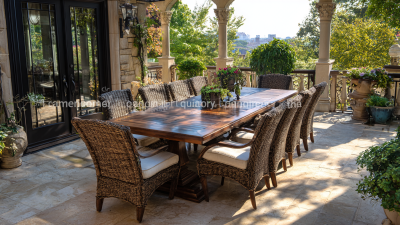
Unmatched Quality in Outdoor Dining Furniture from Global Leading Chinese Manufacturers
-
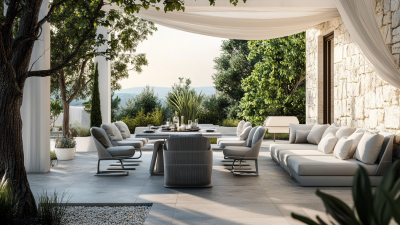
Discovering the Future of Outdoor Dining Sets in 2025 Trends and How to Elevate Your Space
-
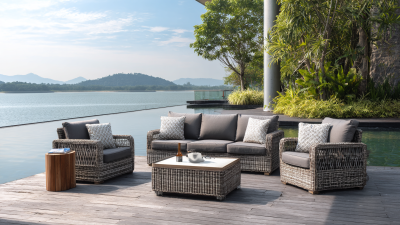
Discover Elite Outdoor Furnishings from China's Premier Factories: Where Quality Meets Innovation
-
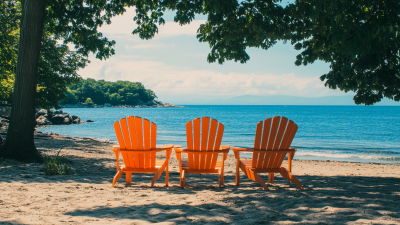
Ultimate Guide to Sourcing the Best Outdoor Chairs for Your Business
-
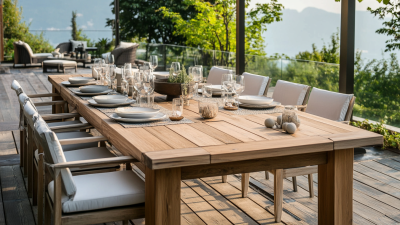
7 Essential Tips for Choosing the Best Outdoor Dining Furniture for Your Space
-
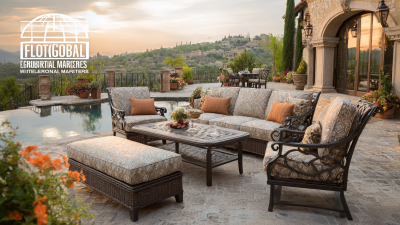
Top Global Patio Furniture Manufacturers Leading the Export Market
-
- about us
- About Us
- Qualification
- Privacy
-
- Packaging products
- Hot Sale
- Outdoor Sofa Sets
- Outdoor Dining Sets
- Outdoor Loungers/Sunbeds
- Swing Chairs
- Single Chair

 English
English España
España عرب
عرب 简体中文
简体中文